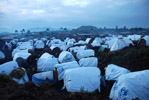
Representatives from United Nations Security Council have visited the Kivu region of Congo to shore up support for MONUC, the U.N.’s peacekeeping mission there, which – with 16,500 soldiers – is the largest peacekeeping force in the world. Touching down with the aim of assessing efforts by MONUC and the Congolese government to secure a region wracked by violence stirred up by numerous rebel groups and by Congo’s own army, the delegation will certainly have much to report back to New York.
In recent weeks, horrifying reports have surfaced on the abuses committed against civilians by the Congolese army and by the FDLR, a rebel force comprised of many of those responsible for the 1994 genocide in Rwanda. Human Rights Watch issued a statement today strongly urging the U.N. delegation to not overlook abuses committed by Congolese soldiers. HRW researchers highlighted numerous accounts from survivors who describe rapes and beatings committed by Congolese soldiers. In one searing account, a 15-year-old rape victim, who recently gave birth to a child she conceived during a previous rape, said:
There were six soldiers who came into my house. They first raped my three-year-old sister, and then two of them raped me while the others looted our house. They threw my newborn baby onto the ground, and because of the shock he is in a lot of pain whenever anyone touches his legs. The soldiers were wearing military uniforms and they spoke Kinyarwanda. There were Hutus and Tutsis and other tribes as well. After they raped me, they took my mother away with them. She hasn’t come back yet, and I think she must be dead. Five other houses in Kihonga were visited the same night by the soldiers.
Human Rights Watch estimates that 19 civilians have been killed and at least 143 women raped by government forces since late January. "The Congolese army is responsible for widespread and vicious abuses against its own people that amount to war crimes," said Anneke Van Woudenberg, senior researcher in the Africa division at Human Rights Watch.
These are the forces with which the United Nations has teamed up to launch a controversial joint operation intended to root out the FDLR in eastern Congo. The operation got off to a foreboding start when it became clear that army commander Bosco Ntaganda, a wanted war criminal accused by the International Criminal Court of recruiting child soldiers and implicated in a massacre of 150 people late last year, would be on the front lines of the operation. And although the offensive is just getting underway, the FDLR is already launching reprisal attacks against the civilian population which have forced more than 100,000 people to flee their homes.
What’s clear from these recent tragedies is that the United Nations sorely needs to rethink its approach in Congo and re-commit itself to its core mandate to protect civilians. We hope the Security Council’s recent meetings in-country will hammer this point home. Speaking to the U.S. Senate last week, Enough co-Founder John Prendergast urged senators to press the Obama administration to demand that the United Nations devise a new strategy for how to use existing resources allocated to the world’s most expensive peacekeeping mission to better protect civilians. “Give them a deadline [by which to come up with this plan],” Prendergast said. “These peacekeepers aren’t going to stop the war, (…) but they can protect civilians in the meantime.”
Photo: Huts in a camp for internally displaced near Goma

